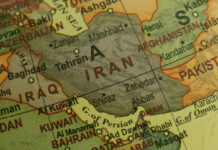Growing up, we played pickup basketball in the schoolyard. Before every game, the best two players would be captains and pick their teams.
“I’ll take Dave.”
“OK, I got Joe.”
It went down the list until someone picked the smallest or weakest kid.
When I look around today, I see that’s what’s happening in the world, except the playground is Eastern Europe and the South China Sea.
I picture the U.S. picking its close friends, like the UK and Australia; Even if they aren’t that big, they’ve got skills and experience. Poland is eager to get into the game. Finland joined our side because from their perspective, we were the lessor of two evils. After all, we’ve never invaded Finland while Russia has. Finally, we pick Israel because we know no one else will.
Russia was begging China to pick it, and they did, but China doesn’t seem very enthusiastic about teaming up with Russia. Sure, Russia represents the big man you need in the center, but they lumber rather than sprint. Russia isn’t half as clever as they think they are, and they aren’t team players. China can’t be sure if Russia will pass the ball when the time comes or if they will hog it and throw up a brick.
France is looking at its shoes, not sure which team it hopes will choose it. They’ve sided with NATO for years, but they are having problems with intestinal fortitude. Whichever team they end up on, they’ll sit on the bench.
There are some new kids in the playground, guys that rarely play in these games. Brazil embraces China and Iran joins their team. South Africa and Saudi Arabia line up over there as well. That represents a change of sides for Saudi Arabia. They better hope the U.S. doesn’t block their shot and take them down a notch.
The Warm Up Period
The two teams warm up, starting a drill here, and exercise there. It’s just for show, some razzle-dazzle to intimidate the other side and sap their confidence. Neither team manages to pull a Mohamed Ali and win with psychological banter before the first punch flies.
India shows up and watches from the sidelines, not sure where to throw their weight. They’ve never liked China, but they are friends with Russia. They may still harbor some resentment for the UK. That makes it a tough choice.
The Rules Change
As more countries show up, the game changes. With so many players, it’s no longer a game of basketball. The name of the game is now capture the flag. No longer will both teams run up and down the court, up a few points in this quarter and then down a few in that quarter. Instead, it’s going to be a large battle fought on many fronts.
China uses surprise to strike at Taiwan U.S. vulnerability. The U.S. will have to decide to defend Taiwan or to sacrifice a pawn and strike deep into enemy territory, looking to win the game in one big attack.
Russia is suddenly playing defense against an aggressive air and naval campaign, and the Europeans are pressing them while the Pacific countries that have always hated China are making their impact felt. China considered them annoying, like biting flies, but there are getting swarmed and stung. Brazil and South Africa have limited capabilities on this field of play. North Korea shoots its wad early and is then knocked out of the game.
Early Chinese Success
At first, China looks unstoppable. They make good progress in Asia and the U.S. defense appears to collapse. On the other side of the world, Israel and the U.S. take out Iran and Saudi Arabia quickly leaves the field. NATO stuns Russia and the early success of team China stalls. Apparently, the U.S. defense didn’t collapse; it drew China in and counter attacked when their supply lines were weakest. As the U.S. defenders are reinforced by resources from other theaters, China finds themselves in retreat. It becomes a rout and China looks around, desperately seeking a teammate they can dump the ball off to, only to realize they have none left standing.
Will China surrender or fight until the bitter end? Then India makes its move, taking advantage of China’s weakness. it invades taking territory and dealing China a blow. Facing a war on two fronts, China surrenders, hoping to live to fight another day.
“Damn,” China says as they limp from the field, looking at the destruction that surrounds them. “I’m sure we would have won if we’d just stuck with basketball.”
“We didn’t change the rules,” says the U.S. “You did.”
My War Analogy
There you go. That’s my war analogy. The world is moving from the picking sides into the training and drills scenario. Will the posing and strutting of one side warn off the other, or will they come to blows? My guess is the latter. In fact, some think Russia is holding back until China enters the war. Then Russia will attack while China distracts the U.S.
Even if a lead bullet, a radioactive isotope, or a hypersonic missile never gets near you, World War Three will upend your world. The economic fallout will be catastrophic. Even if the war is over in two months, win or lose, the repercussions will persist for years.
That’s what we need to prepare for: living on your own with little or no outside support for a few years. That’s on our own as a nation, but also on our own as individuals. Unless we win bigly, war will probably mean the collapse of our economy. It will mean shortages, outages and possibly martial law.
The U.S. will rebuild. We are one of the few countries in the world that has sufficient resources to produce all the oil and energy we need and all the food we need, but it will take time and things will get ugly in that interim period. Faced with war and chaos, woke issues will disappear. Weak leaders will be replaced. Oil and coal will once again reign supreme. The U.S. will rebuild its manufacturing base and countries like India and Mexico will shake our hands and pat our backs with false enthusiasm, trying to convince us they were on our side the whole time.
Sure, we’ll recover. You just have to stay alive until the recovery.







